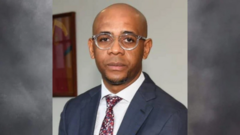In recent weeks, Equatorial Guinea has been rocked by the release of numerous explicit videos featuring Baltasar Ebang Engonga, a senior civil servant and nephew of President Teodoro Obiang Nguema. This scandal, which has seen estimates of 150 to over 400 clips circulating online, is viewed by some not merely as a sensationalist scandal, but potentially as a strategic maneuver within the high-stakes game of political power in the country.
Engonga, also known as "Bello" due to his good looks, was arrested on October 25 on allegations of embezzling state funds, with authorities claiming he funneled money into secret accounts abroad. His incarceration in the notorious Black Beach prison, known for its brutal treatment of political dissenters, has raised eyebrows amid a backdrop of corruption and human rights abuses in Obiang's regime. With the president having been in power since 1979, questions around succession loom large, especially as the 82-year-old leader’s long tenure has seen increasing discontent among the populace.
The leaked videos depict Engonga having sexual relations with various women, many of whom reportedly are connected to high-ranking officials. Some of these women are believed to have been aware they were being recorded. Given the secrecy of Equatorial Guinea's political landscape, where a free press does not operate, the origins of these leaks remain shrouded in mystery. However, theorists suggest the tapes may serve as a method to discredit Engonga and eliminate potential threats to the vice president's succession plans.
Vice President Teodoro Obiang Mangue, who has ambitions to inherit the presidency, has been implicated in efforts to politically eliminate those like Engonga, who could interfere with his rise. The political intrigue in Equatorial Guinea is layered with accusations of internal struggles among the elite, often punctuated by scandal and intrigue. Activist Nsang Christia Esimi Cruz argues that, amid this theatrical narrative, the wider issues of governance and corruption are being obscured. He suggests that the video leaks could also provide a pretext for the government to tighten control over social media, further limiting the spread of dissenting viewpoints.
The scandal has drawn significant attention from outside of Equatorial Guinea; interest in the country spiked as discussions swirled on social media. In response, the government has attempted to mitigate damage to its image by calling for increased surveillance and strict measures against what it deems inappropriate behavior among officials. Despite these efforts, the clips continue circulating, causing further unrest within a society already rife with corruption and authoritarianism.
Activists point out that while the scandal may offer a glimpse into the decadence of the nation's elite, it ultimately highlights systemic rot within the country. The case of Baltasar Ebang Engonga, rather than being just an individual scandal, reflects deeper societal issues, making it clear that Equatorial Guinea faces considerable challenges that go far beyond sensational news coverage.


















